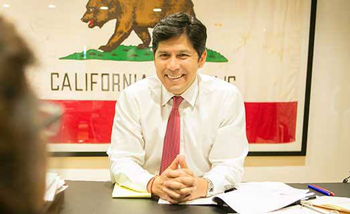July 1, 2016 - SACRAMENTO — The California Legislature yesterday gave final approval to the “No Place Like Home” initiative, a first-of-its kind plan to assist local communities in preventing and addressing homelessness. This proposal provides $2 billion for the construction and rehabilitation of permanent supportive housing for homeless individuals with mental illness. The “No Place Like Home” initiative takes a “housing first” approach, which has been used successfully in other states and is considered best practice by many homeless advocates and social service experts. The measure, AB 1618, now awaits Governor Jerry Brown’s signature.

“Homelessness is not a partisan issue and it has been an honor to work with my Republican colleagues in the Senate and Assembly to tackle this issue head on,” said Senate President pro Tempore Kevin de León (D-Los Angeles). “Republicans and Democrats alike recognize that finding permanent supportive housing for the chronically homeless suffering from mental illness will improve the quality of life in our communities and give hope to thousands of Californians currently living in despair across our state.”
“This is a tipping-point moment for mental health, homelessness, and Proposition 63 in California,” said former Senate leader Darrell Steinberg, co-author of Proposition 63 (2004) – The Mental Health Services Act – and founder The Steinberg Institute. “Thanks to the leadership of this Senate, we have a historic opportunity to help local communities forge systemic long-term solutions, making a real difference in the lives of thousands of forgotten Californians.”
The legislation package re-purposes bond money from Proposition 63, the Mental Health Services Act, and creatively leverages billions of additional dollars from other local, state, and federal agencies to achieve the following goals:
Housing:
- $2 billion bond to construct permanent supportive housing for chronically homeless persons with mental illness.
- $45 million included in the 2016-17 budget to provide supportive housing in the shorter-term, rent subsidies, while the permanent housing is constructed or rehabilitated.
- $22 million included in the 2016-17 budget to support two special housing programs that will assist families:
- The “Bringing Families Home” pilot project, a county matching grant program to reduce homelessness among families that are part of the child welfare system.
- The CalWORKs Housing Support Program, which provides housing and support services for CalWORKs families in danger of homelessness.
- An increase in Supplemental Security Income/State Supplementary Payment (SSI/SSP) program grants which provide income support for the aged, blind, and disabled poor who cannot work.
Rates of homelessness are higher for persons with disabilities who cannot work; SSI/SSP is intended to help them make ends meet, and a large portion of grants usually goes toward rent.
These increases will assist about 1.3 million low-income Californians (72% with disabilities and 28% who are elderly).
- A one-time investment of $45 million in the 2016-17 enacted budget to incentivize local governments to boost outreach efforts and advocacy to get more eligible poor people enrolled in the SSI/SSP program.
The federal government covers 72% of the total costs of the SSI/SSP program, so state and local benefits are multiplied significantly for each newly eligible recipient.
California has more than one third of the nation’s chronically homeless – those with mental illness or other significant problems, and an even higher percentage among homeless women. Of the 28,200 chronically homeless in California, nearly 85 percent are unsheltered with this group absorbing the greatest amount of taxpayers’ resources, often toping $100,000 annually per person in public costs for emergency room visits, hospital stays, law enforcement, and other social services.
The legislation package supports a “housing first” strategy which many homeless advocates and social service experts across the state prefer because it provides safe, secure housing creates an environment that allows for wrap-around services, such as mental health treatment, to take hold. Studies show homelessness aggravates mental illness, making it more difficult to reach and house those with the greatest need of shelter and treatment.
Source: Senate President pro Tempore Kevin de León








